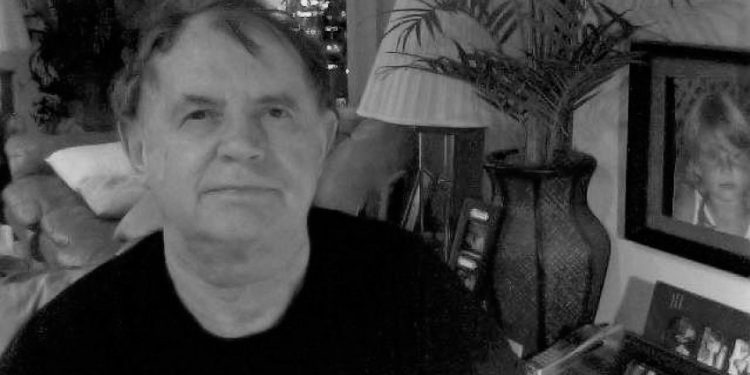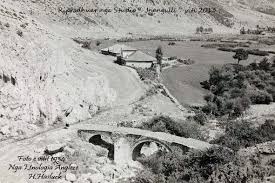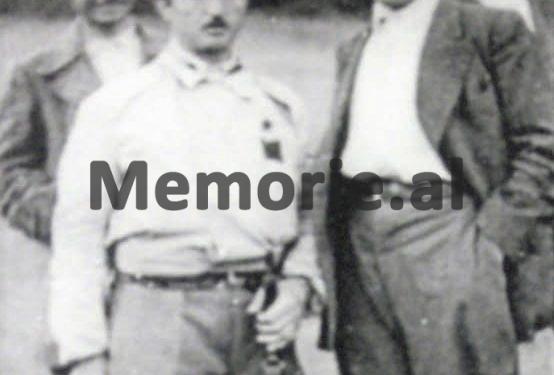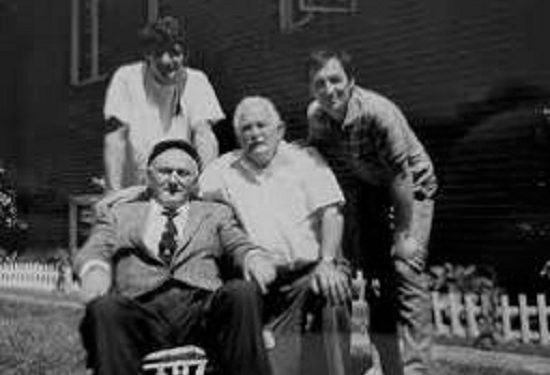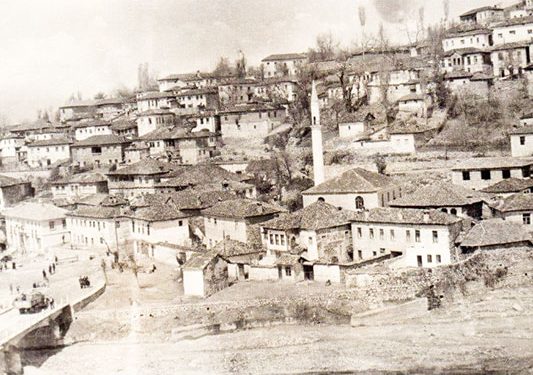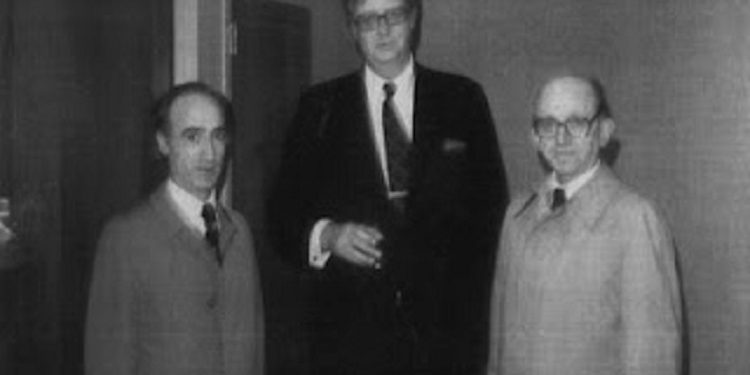By Beqir Sina
Memorie.al /“I was very young, and I never even thought about escaping from Albania, but it was my brother, about 13 years older, who knew more about the events that had happened to our large family. Our Previzi family, in Zerqan, Dibër district, was quite well-known in that area of the Great Gorge of Dibër, as it was and is called. This Dibër family was distinguished for its generosity and hospitality, as well as for its manliness and bravery, as well as being involved in political activities, of all times”, this is how Mr. Hysen Previzi, originally from the Dibër district and residing in the USA since 1963, expresses himself, among other things, when his family of many members, fled Albania, to escape the savage repression and persecution that the communist regime of Tirana had exercised until that time, against the Previzi family. For more about this and the work and activity of Mr. Hysen Previzi, as a journalist at Radio “Zani Atdheut”, we know the exclusive interview with him, which we are publishing below in this article.
Mr. Previzi, what is your family’s past?
My father Mahmud Previzi was the sub-commander of the gendarmerie forces of the Zerqan sub-prefecture, while my uncle Bajazit Previzi was the sub-prefect of the Zerqan sub-prefecture, during the government of the Albanian Kingdom of Zog. When the country was occupied by the communist clique, my father, as well as our entire large family, did not agree with that regime. My father, with a handful of gendarmes, who were left, at that time tried to defend Zerqan from the communist forces, led by Dali Ndreu, but, betrayed by some supposedly nationalists, consisting of more than 300 people, was defeated.
Zerqani was taken by the communists; our big house was burned down. All our property including land and livestock was confiscated. As a result, the family was initially interned in Berat, when I was just a baby. In the internment camp in Berat, our family also had contact with other nationalist families from all over Albania and Kosovo. There were also the families from Dibra, such as; Kaloshi, Ndreu, Kaziu, Lita, Dema, Tonuzi, and the family of Beqir Sina the First, with whom we had been friends for a long time, as well as many, many others.
Why and how did you escape from Albania….?
My father, after a stay of nearly four years in the mountains of Dibra, not agreeing, as I said above, with the communist clique, continued to hope that help could come from the Anglo-American forces. He was heroically killed in the struggle with the communist forces, yes, again betrayed by his brother-in-law in 1949 (whose name is not necessary to mention). After the murder of my father, the family was released from exile and came back to Zerqan. According to my mother’s story, the house burned down, the land confiscated and distributed in “agrarian reform”, we settled in an old and dilapidated house.
Considered kulaks, without access to high school, and always under the surveillance of the State Security, we spent several years. My brother Fiqiriu, convinced that he could not cope with that bloody regime, took courage and in October 1963, decided to escape together with our two cousins, Sami and Basri Alliu, as well as other family members. It is worth noting that more than half of the family did not manage to cross the border to the former Yugoslavia. My mother, as well as my brother Fiqiri’s wife, with 5 children, as well as Sami’s wife and mother, were captured by the border forces at the border. They were again interned in the notorious camps, such as the one in Shtyllas in Fier, when they were only released with the advent of democracy in 1991.
When did your connection with patriots and anti-communist groups begin, and what role did you have in them?
It must be admitted that: “In various cases, emigration in the former Yugoslavia was treated according to the appetite of the Yugoslavs.” This is self-evident and does not need elaboration, because that was the circumstances of that time – “it was between two fires.” In some cases, emigration was supported and at other times, it was despised by the Yugoslav regime…! During emigration in Yugoslavia, you could not say that you were anti-communist or patriot, nor could you be active as such. The former Yugoslavia, although it played a more “soft” policy with immigrants, for its economic and political interests, was communist and a camouflaged dictatorship.
The former Yugoslavia, in many cases, used Albanian political emigration as cannon fodder, just as it used some other Albanians. However, during the emigration to the former Yugoslavia, we had the opportunity to reunite with more nationalists who had previously fled to that country and to find truly patriotic Albanians. It is worth mentioning, as I mentioned above, our family friends, some of whom we also stayed within the internment camp in Berat, such as; the brothers Rasim, Hashim and Besim Sina, Abdulla Kaloshi, Qazim Lusha, Mane Dumani, Sefer Lleshi and many others. Our political role was only to leave for the West, where we could have the opportunity to help the families we had left behind, but also Albania and Kosovo, all the Albanian lands occupied by Serbia.
So in 1965, many of us took the path of escape from Yugoslavia, and went to Italy. There we met and connected with many other fugitives, anti-communists and well-known patriotic figures of the national cause.
You were part of the Legality Movement Party in exile – what was this organization, how did it operate, and what was your role?
After a short stay in a refugee camp in Italy, we ended up in the free and most democratic world in the world, which is America. As soon as we arrived in the United States of America, we set to work, to achieve what we never found easy to do, neither welfare nor politics. Remembering our ancestors, who fell heroically for the good of the country, to defend that country that would be overrun by the bloody communism of Enver Hoxha and his comrades, we joined once again, the National Legality Movement Organization, today the Legality Movement Party. I was only twenty years old when I joined the ranks of the OKLL. I participated in various meetings and manifestations.
We organized demonstrations against the totalitarian regime of Enver Hoxha, but at the same time, we did not leave out those demonstrations against the Yugoslav Titoists and Rankovics, who oppressed the unprotected people of Kosovo and all Albanian lands, under the former Yugoslavia. I personally was elected several times as a member of the OKLL Central Committee, where together with several other patriots, we made our contribution. I worked closely with the Secretary General of the OKLL, Mr. Fuat Myftia, as well as other worthy and honest members, such as Colonel Xhemal Laçi, Mr. Rasim Sina, Mr. Hysen Mulosmanaj, Mr. Abedin Mulosmanaj, Mr. Bardhok Ndreu, Mr. Nrec Gjergji, Mr. Dr. Guri Durollari, and many others.
What would you like to highlight from that period?
The years passed, patriotism and bravery had a slight decline, a slight weakening decline in society, old age was taking its toll. Hopes for a quick return to Albania were fading day by day. A bigger job was needed. A stronger organization was needed to restart the engines of political feeling once again. Our political opponents were becoming even stronger. There was the economic emigration of Kosovo Albanians, where some of them, financed by the Yugoslav Government, had supposedly come for business.
In New York, another radio station was opened, then called “Zëri i Malësia” and was fully financed by the Albanian communist government, as well as by Kosovar emigrants and those from Montenegro and Macedonia who were with Enver. If I am not mistaken, it was the beginning of 1981 – when in Kosovo, riots broke out organized by Albanian students, who were being suppressed and imprisoned by the Yugoslav chauvinist machine. On our part, a mobilization is required – to inform the emigration as best and accurately as possible about the events in Kosovo. So in the spring of 1981, the idea of opening a radio broadcast from New York was born.
So, you had founded the Albanian radio station Zani i Atdheu in New York, as a staff of this radio station, what does it remind you of today? How did the idea for creating this radio station come about?
As I mentioned above, it was the spring of 1981, when, at the initiative of His Highness, Leka the First – King of the Albanians, in collaboration with a close circle of members of the OKLL, requested that a radio broadcast be made possible in New York, to revive the patriotic feelings of the Albanian political emigration. He engaged Colonel Xhemal Laçi, to realize the Radio. Col. Laçi, a man of great culture and educated in the West, appointed Mr. Rasim Sina, as the director of this Radio Station and Mr. Hysen Mulosmani as the editor-in-chief and both as the main speakers.
After this initiative, it was decided that the Radio would be an organ of the Royal Court and be called “ZANI i ATDHEUT”. Radio “Zani Atdheut” resonated in the ranks of the emigration. Zani Atdheut was supported by many emigrants, both morally and financially. The radio informed our compatriots with news from events in our country, Kosovo, Albanians in Montenegro, Macedonia and the Presevo Valley, as well as elsewhere, in the diaspora. It is worth noting that even though we were fought by various individuals, whether Enverists or of other political orientations, “Zani Atdheut”, did the job that was due to it. The director of Radio “Zani Atdheut”, Mr. Rasim Sina, assisted by its editor-in-chief and editor Mr. Hysen Mulosmanaj, as well as myself (Hysen Previzi), but also other collaborators, contributed until the end, until in Albania, in 1992 – we “reborn a beacon of democracy”. I say a “beacon of democracy”, because it never came close to the most democratic Western era, at least what our people remember, during the reign of King Zog I.
How would you describe your collaborators – of this radio?
It was a special pleasure, especially when I worked with these dedicated and passionate people for the radio. The day and hour of the broadcast on the air would come, the time to broadcast on Radio “Zani Atdheut”, as if we were waiting for a great hope, what news we had to say from Albania and, from Kosovo and the Albanian lands under the former Yugoslavia. The radio started its program, with our national anthem, original, which began and was followed by the voice of the speakers: “The voice of the Fatherland, the voice of Freedom, the voice of the Albanian Monarchy, in Exile” speaks to you.
We were ready to inform our many listeners at that time, with the internal and external news, that we had managed to receive both from Albania, through foreign agencies, and American newspapers, as well as with what was happening in Kosovo and the Albanian lands, mainly from our people, who we had there. We had different news from our community in America and elsewhere. We fulfilled the wishes of our listeners, with different songs, with festive and wedding greetings, etc., we announced deaths and sorrows in other communities.
My two radio collaborators, Rasimi and Hyseni, were wonderful, although I was much younger than them; I always got the best advice from them. From this radio I also learned a lot about journalism, so much so that in 1988, until 1990, I worked as a journalist with the Radio “Voice of America” from Washington. But it is worth noting that at that time, because they were still afraid that the Tirana regime would take revenge on the employees of this American government radio, their names were not often given one of them, I was also, who spoke several times in the news programs.
How did you follow the events of that time? After you released the information, it is said that referring to the New York Times and Western agencies. Radio “Zani i Atdheut” gave the first news that Mehmet Shehu was killed, what was the reaction of the local and Albanian press at that time?
Yes, indeed, it is true, it was that Radio “Zani i Atdheut”, in Albanian, from New York, first reported the news on December 19, 1981, one day after the newspaper ‘New York Times’ published it, in an article by its journalist in Belgrade, Wolfgang Sachsone. This was the time when we received the news that in Kosovo, the great Albanian movements had taken place, those that were called at that time with the main slogan; “Kosovo Republic”, that is, for those great Albanian demonstrations of 1981 that shook the foundations of Tito’s Yugoslavia, at that time.
According to your archive: “Zani Atdheut”, said that: “The New York Times, writes today, that Mehmet Shehu, the prime minister of Albania, committed suicide, at the beginning of today”, right?!
Yes, more than true! Radio “Zani i Atdheut”, also quoted a news bulletin of the Radio from Tirana; “For Albanians Abroad”, the capital of Albania, where it was said at the time that; the 68-year-old communist leader, in office since 1954 and the man widely considered a successor to the leader of Albania, the first secretary of the party, Enver Hoxha, had committed “suicide” “in a moment of nervous anxiety”! But, without giving any details and without further ado, the program continued with music”! We immediately said that; “this leaves much to be suspected and the situation will worsen in Albania”, which happened anyway, it was accompanied by arrests and other shootings, of Kadri Hazbiu and Feçor Shehu.
How did you welcome the death of Enver Hoxha, what impact did it have on the community?
Enver’s death, we, all patriots in the diaspora, welcomed with cheers and even more shots in the air (in the homes of those who were far from the residential centers). After the news, phone calls started coming in from all directions, as hope was once again revived; that Albania would change and open up, the communist regime would fall and we would meet our relatives in Albania. The death of Enver, the next day, was reflected as the biggest event of that day, by the newspaper “The New York Times” a special and rare occasion for the largest newspaper in the world, the New York Times.
This newspaper even prepared a special for the passing of the dictator Enver Hoxha, a day after he died, that is, the next day on April 12, 1985, writing about the career of the Albanian dictator, from his beginnings to the last days of his life (which was something rare for such a large American newspaper to devote so much space to the death of a dictator). But, in the community, of course, there were also those who welcomed him with tears in their eyes….! Radio “Zani Atdheut” prepared its own editorial, where it pointed out that “Albania will now breathe freely and that Ramiz Alia will be the one who will lead Albania towards an opening with the West”.
How was the overthrow of the communist regime in Albania received by Albanians in America?
Among Albanians in America, it was received in two ways; one side rejoiced to the sky, the fall of communism, the opening of Albania, while the other side received it as if in “mourning”, with their heads bowed. This was of course because there were those who felt sorry, but, from the thought that they would benefit from something, because they had been connected to Tirana, they “mourned”, not because they wanted communism in the community. And ironically, some of them, later, became even more patriotic and democratic than us, who suffered the olive groves for nearly 50 years. As I told you about Radio “Zani i Atdheut”, which was the only anti-communist radio station that fought for a free and democratic Albania, an Albania with its eyes on America and the West, and not on Russia and China, was greeted with good news that gave hope.
During your work – have you and your colleagues ever been “attacked” because of the Radio’s stances? Which are said to have been patriotic and anti-communist, for an Ethnic Albania?
In fact, I personally have not experienced any threats from anyone, and it has never occurred to me to take care of that issue, and I do not say this to brag. But there were no threats and verbal clashes, but anonymous threats and insults, after the news ended, from some Albanian, of course, who did not like it, when we attacked the Tirana government. Even today, I do not understand what they thought of the Tirana regime?!
Was it difficult to maintain such a radio station during the communist rule?
Of course, everything that is not paid and has to be paid from your own pocket has its difficulties. For example; “Will you go to work, to protect your family, and will you donate the remaining time to your family or to the Radio”?! However, when Radio “Zani i Atdheut” was closed, its regular listeners, those who contributed financially, and who were from Albania, Kosovo, the Presevo Valley, Montenegro, Macedonia and Chameria, and some religious leaders, and others, reacted immediately to the closure of the radio, expressing their regret. After all, when Radio “Zani i Atdheut” was closed, there was still a need for a popular, Albanian radio program, which, despite all the difficulties of existence, kept them hopeful, until the day democracy came and the former Yugoslavia disintegrated, and in the Albanian lands, the wind of freedom began to blow.
We have also accepted the remarks of that time, which came to us in advance from listeners, regarding professionalism, which were of course acceptable, since at that time there was no such technology as there is today. So, it was not easy to find the news, and to make the news that the community needed, since Albania was hermetically sealed, while Kosovo and the Albanian regions were under the censorship and brutal oppression of the Serbo-Slav police and the UDB, which persecuted Albanians wherever they moved.
But, I say it with conviction even today, that until the day we closed the radio: “We were the only Albanian radio in America, which the listener of that time trusted, because we had accurate reporting, and, always referring to reliable sources, the most prestigious Western agencies, that brought out some news from the Albanian lands and Albania, and that was for our common interests, with the listeners”, which also eased the difficulties of the time.
What were the role of the radio “Zani Atdheut” in New York, in the liberation of Kosovo, the fight for the rights of Albanians under the Slavic-communist rule in the former Yugoslavia and the issue of Chameria?
Radio “Zani Atdheut” has always raised its voice for the rights of Albanians in Kosovo, Montenegro, Macedonia, Presheva, Bujanovac, Medvedevje, and in Chameria. Radio “Zani Atdheut” categorically rejected the voices of the then Albanian government, in its propaganda – for a Kosovo under the Yugoslav federation, as was the position of Tirana at the time. “Zani Atdheut”, has been; is and will be in our beliefs – for a Kosovo, and all ethnic Albanian lands united with mother Albania. After all, Radio “Zani i Atdheut”, in New York, was founded at a time when Albanians in their lands were oppressed and mistreated, even though they were in their homes and lands, they were forcibly expelled, and were on the verge of ethnic cleansing, as time will show, how events unfolded later. Albania, at that time, was under the most brutal communist dictatorship in the world, and we sought freedom and democracy, the opening of Albania.
The radio was created at a time when Tirana’s propaganda was at its peak abroad, and it was spending millions of dollars in the diaspora to propagate “thriving Albania” in the USA, with the distribution and sale of magazines, books and videos, and the works of Enver Hoxha, at that time. We were created at a time when there were other Albanian radio and newspapers in the diaspora, and they said that they too were fighting for the Albanian cause! But, it must be admitted that the media, which had directors from Kosovo, Montenegro, the Presevo Valley, at that time, were afraid to do our job, and to give the news that we gave about Albanians and what was happening to Albanians, in their lands.
This was because the directors of other radio and newspaper stations in the diaspora were “afraid”, after they had left their relatives and families in their homeland, like in Kosovo, or other Albanian regions.
And, the UDB in exile was very dangerous, at that time, it was very well-established, so it had penetrated everywhere in the community, following every movement of Albanians who wanted Kosovo, Albania and our ethnic lands. There were some of them, since they had left their homes, who did not dare to return and visit their parents, in Kosovo, Montenegro and Macedonia, for fear that they would be mistreated and even put in prison, for their anti-Yugoslav activity. Because, everything that happened in the diaspora was filmed and recorded by Serbian agents, in America, from the Yugoslav mission, in Manhattan, or other cities in America. And the footage of their photographers was immediately sent to Belgrade.
Not once but several times it has happened that when Albanians from the diaspora went there, they were arrested or mistreated – right from the Belgrade airport, or the police went to their homes and called them in for so-called; “informational talks”, as they were called at the time. Or as was the case with Ivezaj, which we were the only radio station to broadcast at the time, since it was an event that also involved the American government, the most prestigious American press and “Voice of America”.
Do you think that the ideal that nourished Radio “Voice of the Fatherland” for 15 years in the diaspora has been realized today!
Of course it is! And, of course, it can be said that there is still a lot to do, but today, more than 99 percent of the Diaspora are aware that the path we started was in the right of the nation and those who opposed us were on the wrong path. The work we did at Radio “Zani Atdheut” was a great noble and patriotic work. It was a voluntary work; it was a work with national responsibility. Radio “Zani Atdheut” raised the voice of the Albanian Kingdom, with its postulate; “United Albania – Ethnic Albania”. No matter how honorable a Kingdom may be, today, look at the most developed and richest countries in the world, they have and keep their Kings. Therefore, I think that we Albanians too: “Without a kingdom, there will be no united Albania, no Ethnic Albania”! Memorie.al




